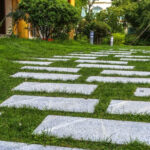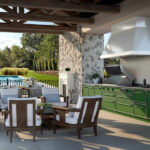When designing an outdoor space, hardscaping plays a crucial role in both aesthetics and functionality. From walkways and patios to retaining walls and driveways, selecting the right material can enhance durability, boost curb appeal, and increase property value.
The three most popular hardscape materials—natural stone, pavers, and concrete—each offer unique benefits. But how do you choose the best one for your landscape? In this guide, we’ll break down the pros, cons, and best uses for each option to help you make the right decision.
Natural Stone: Timeless Elegance & Durability
What is Natural Stone?
Natural stone includes materials like flagstone, slate, limestone, and granite, all of which provide a luxurious, organic look that blends seamlessly with nature.
Benefits of Natural Stone
✔ Unique & Aesthetic Appeal – No two stones are alike, giving your outdoor space a distinct, high-end look.
✔ Durable & Long-Lasting – Can withstand harsh weather conditions and requires minimal maintenance.
✔ Eco-Friendly – A sustainable choice as it comes directly from nature.
✔ Non-Slip Surface – Ideal for pool decks, walkways, and patios.
Drawbacks of Natural Stone
✔ Higher Cost – More ex pensive than pavers or concrete due to material and installation costs.
✔ Limited Color Choices – Natural stone comes in earthy tones, which may limit your design options.
✔ Installation Complexity – Requires skilled professionals for proper cutting, leveling, and placement.
Best Uses for Natural Stone
✔️ Luxury patios & walkways
✔️ Garden pathways & stepping stones
✔️ Outdoor fireplaces & water features
Pavers: Versatile & Customizable
What are Pavers?
Pavers are pre-cut stones made from concrete, brick, or natural stone, designed to interlock for flexibility and strength. They come in various shapes, sizes, and colors for a fully customizable hardscape.
Benefits of Pavers
✔ Wide Variety of Designs – Available in different textures, colors, and styles to match your aesthetic.
✔ High Durability – Can handle heavy foot traffic and vehicle loads, making them great for driveways and patios.
✔ Easy to Replace – Individual pavers can be swapped out if damaged, unlike concrete slabs.
✔ Good Drainage – Permeable pavers allow for better water absorption, reducing runoff and erosion.
Drawbacks of Pavers
✔ Higher Initial Cost – Quality pavers can be expensive, but they add long-term value.
✔ Weed Growth & Maintenance – Gaps between pavers may allow weeds to grow, requiring occasional upkeep.
✔ Labor-Intensive Installation – Requires proper base preparation and leveling to prevent shifting.
Best Uses for Pavers
✔️ Driveways & walkways
✔️ Pool decks & patios
✔️ Courtyards & garden borders
Concrete: Affordable & Functional
What is Concrete?
Concrete is a budget-friendly, durable material that can be poured into molds to create driveways, patios, and pathways. With modern decorative techniques, concrete can mimic natural stone or pavers for a custom look.
Benefits of Concrete
✔ Cost-Effective – Typically the most affordable hardscape option.
✔ Smooth & Uniform Appearance – Creates a seamless, modern look that works well for contemporary designs.
✔ Low Maintenance – Requires occasional sealing but resists weeds and shifting.
✔ Customizable with Stamping & Coloring – Can be stamped to resemble brick, stone, or tile for a stylish finish.
Drawbacks of Concrete
✔ Cracking Over Time – Due to weather changes and settling, concrete can develop cracks.
✔ Limited Repair Options – Unlike pavers, fixing cracked concrete usually involves resurfacing or replacing an entire section.
✔ Slippery When Wet – Smooth concrete surfaces can become hazardous without proper texturing.
Best Uses for Concrete
✔️ Driveways & walkways
✔️ Modern patios & outdoor seating areas
✔️ Outdoor kitchens & fire pits
How to Choose the Best Hardscape Material for Your Landscape
Still unsure which material is right for you? Consider the following factors:
✔ Aesthetic Preference – If you want a natural, high-end look, opt for natural stone. For modern or customizable designs, go with pavers or stamped concrete.
✔ Budget – Concrete is the most affordable, while pavers offer a balance between cost and design flexibility. Natural stone is the most premium option.
✔ Climate & Durability – If you live in an area with extreme weather conditions, natural stone and pavers offer better durability than concrete.
✔ Maintenance Requirements – Concrete requires the least maintenance, while pavers need occasional weeding and sealing.
Conclusion: Transform Your Outdoor Space with the Right Hardscape
Choosing the right hardscape material—stone, pavers, or concrete—is key to creating an outdoor space that enhances beauty, durability, and functionality. Whether you’re looking for a luxurious stone patio, a paver driveway, or a sleek concrete pathway, each material offers unique benefits tailored to your needs.
At Enviroscape, we specialize in custom hardscape installations that bring your outdoor vision to life. Our expert team ensures quality craftsmanship, seamless design, and long-lasting results.
📅 Schedule a consultation today to explore how we can transform your landscape with the perfect hardscape materials!






